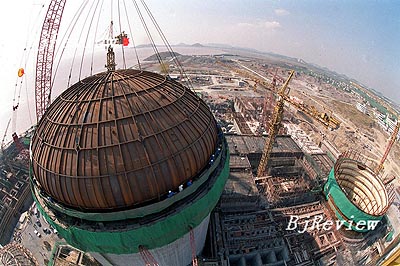|

After a recent earthquake in Japan caused radioactive leaks at a nuclear power plant in Tokyo, the safety of nuclear energy has again aroused public attention. Huo Yaoguang, Secretary General of the Society for Nuclear Power Generation of the Chinese Society for Electrical Engineering, told Beijing Review that it is not necessary to worry about similar accidents occurring in China.
"No accident has ever occurred at China's nuclear power plants and China's utilization of nuclear energy is safe," said Huo.
Choosing safe sites
As an expert in the utilization of nuclear power in China, Huo has been appealing to speed up the development of nuclear power, but he said that the top priority is safety.
"Factors of safety and environmental protection are both considered when choosing sites for nuclear power plants, incorporating both the impacts of the plants to the environment and the impacts of the environment to nuclear power plants," Huo said.
According to Huo, when China chooses a site for a plant, how susceptible the area is to natural disasters is first considered. Disasters such as earthquakes, windstorms and floods are all taken into account. Areas far away from earthquake faults and high earthquake intensity and without threats of floods are chosen as priority sites. Moreover, during planning and construction, Chinese engineers utilize building techniques with high shock resistance to protect against the event of a strong earthquake.
Dayawan Nuclear Power Plant was one of the first nuclear power plants constructed in China. Statistics provided by its operator, China Guangdong Nuclear Power Corp., show that the nuclear reactor can be run safely against 7.0 earthquakes and be safely shut down in the event of an 8.0 earthquake. The workshops can resist earthquakes higher than 8.0.
Qu Jingyuan, professor at the Institute of Nuclear and New Energy Technology of Tsinghua University, said that nuclear power plants should also be located far away from combustible and explosive goods, such as oil facilities, explosive depots and military facilities. If choosing a location near such facilities, a nuclear power plant must be constructed further than a safe distance. Assessments are also made for how other types of explosions, such as those coming from goods transported by rail, road or air, could influence the reactor.
Mature application technologies
Since nuclear power plants do not explode, the major danger is a radioactive leak from the nuclear reactors.
"Our nuclear application technologies can ensure safe operation of nuclear power plants and radioactive leak accidents will not occur in China's nuclear power plants," Huo said.
According to Huo, all the nuclear power plants in China have safety shells made of 1-meter-thick reinforced concrete. These can resist not only windstorms, but also attacks from light fighter planes. Between the radioactive material and the safety shell, there are also fuel claddings and reactor pressure vessels. "With these three solid defenses, even if only one defense is intact, there won't be a radioactive leak accident," said Huo.
When choosing sites for the second stage of the Ling'ao Nuclear Power Plant and the Liaoning Hongyanhe Nuclear Power Plant, under construction now, disaster factors such as earthquakes were fully considered and examined by the National Nuclear Safety Bureau. In nuclear reactors, a technology improved by China more advanced than that in Dayawan was adopted, with very little possibility of an accident.
The fourth generation reactors now in research are called "foolproof reactors" by Huo Yaoguang. If an accident occurs, the reactors will cool down automatically.
| 